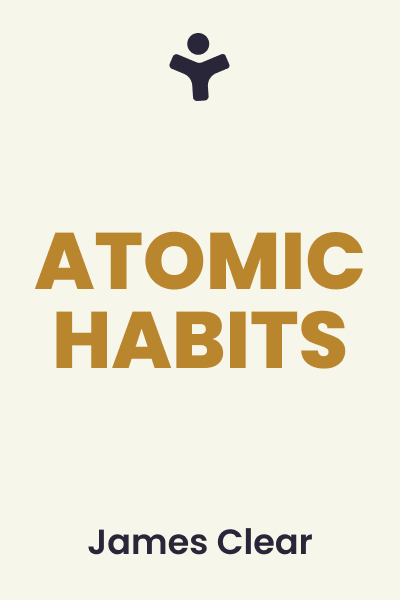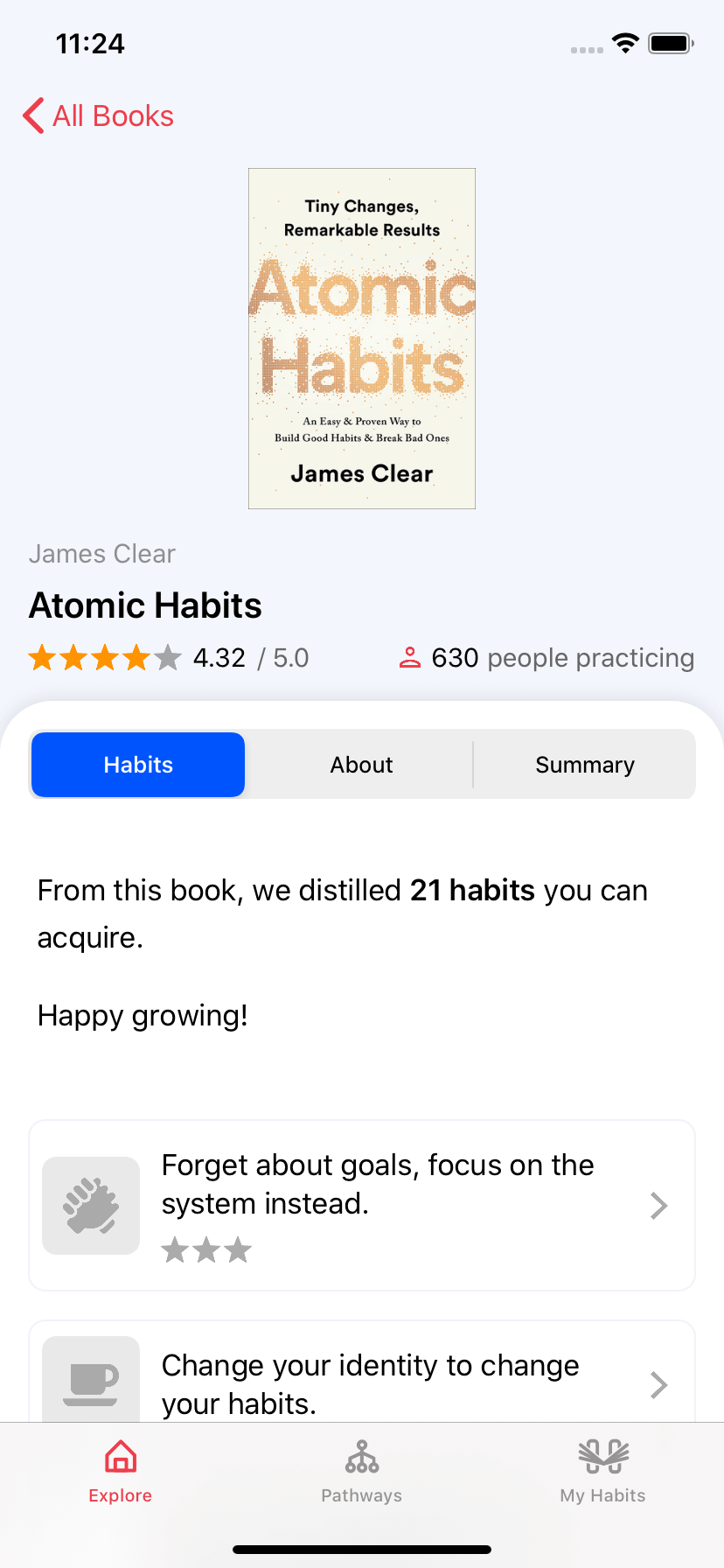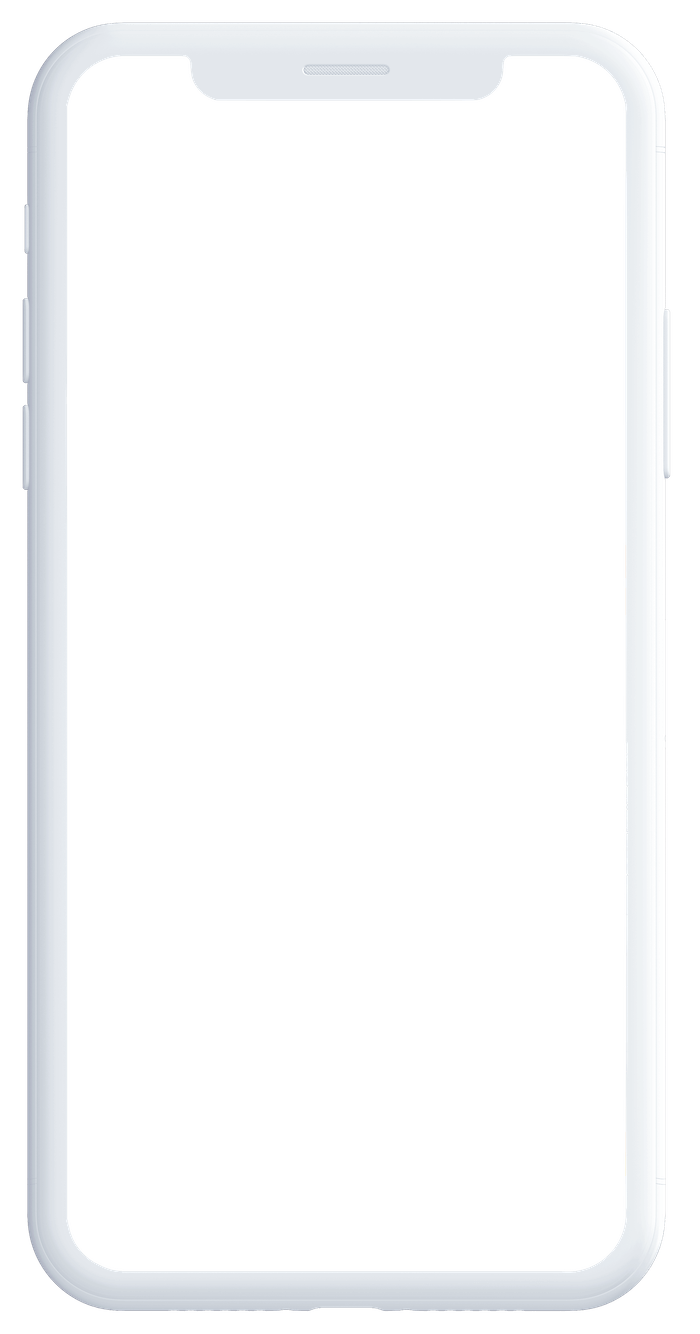
Atomic Habits: An Easy & Proven Way to Build Good Habits & Break Bad Ones
by James ClearThe secret to having a successful life is not a single habit. It’s many habits that compound and create a system of living. One single habit may change your life by 1%—it’s too small to notice. But what if you create one habit every day for 365 days? You will become 37x better! That’s the power of small improvements every day.
This book about habits is based on new research and the experience of James Clear.
The surprising power of atomic habits
“If you can get 1 percent better each day for one year, you’ll end up thirty-seven times better by the time you’re done.”
What people see is a breakthrough. What people don’t see are all the small details that happened before it. And those small things are the reason that one becomes successful. All the small actions and habits one establishes are what drove them towards success every single day.
Small habits compound over time, and they are barely visible at the beginning. Only after time can they build into a powerful system. We expect that when we improve slowly, the effect will be linear and that we will see the positive difference right away. It’s discouraging if we don’t see progress. However, progress is not linear. It’s exponential, and barely visible at the beginning. It takes some time to see results.
You have to trust the system and not expect immediate results.
Actions to take
How your habits shape your identity (and vice versa)
“The goal is not to run a marathon, the goal is to become a runner.”
The foundation of every lasting change is identity. You can change your outcomes or your processes; however, if you don’t change your identity, you will eventually come back to your old habits. For example, if you want to stop smoking, and you keep saying, “I’m trying to quit smoking,” it’s the outcome you are trying to change. Lasting change can only come through identity change. In this example, you must start saying, “I’m not a smoker.”
If good habits are in conflict with your identity, you will fail to establish them.
Actions prove your identity. It’s not enough to say, “I’m a runner.” If you run two times a week, your actions prove that you truly are a runner. The best way to change who you are is to change what you do. Your actions give proof of who you are. For example, if you write two pages every day, you are a writer.
Actions to take
How to build better habits in four simple steps
“Habits do not restrict freedom. They create it.”
Habits exist in order to help us do repetitive things automatically. Our brain can only think about one thing at the time; however, we are able to do many activities at the same time as long as they are habitual. Good habits make our life easier. However, with too many bad habits, our life can be really tough.
There are four parts to a habit: Cue, Craving, Response, and Reward. Let’s take a closer look at them:
-
Cue - the cue triggers the brain to a certain behavior.
-
Craving - this is the motivation behind the habit.
-
Response - this is the action to perform.
-
Reward - it has two purposes, to satisfy us and to teach us.
Actions to take
The man who didn’t look right
“Until you make the unconscious conscious, it will direct your life and you will call it fate.” - Carl Jung
We are not aware of most of our habits. They simply happen automatically. When the cue occurs, we go through the whole habit without noticing any part of it.
You can increase your awareness and find out about your habits by using the Habit Scoreboard method (described below).
When we do things automatically, we can make mistakes because we are not always conscious of what we are doing. There is a method called Pointing-and-Calling, that may help you to minimize mistakes. Designed by Japanese managers, it is used in many industries that require constant awareness (like the metro management system). Use this method to make unconscious habits more conscious.
Actions to take
The best way to start a new habit
“People who make a specific plan for when and where they will perform a new habit are more likely to follow through.”
In order to start a new habit, you must define the place and time very precisely and say to yourself what exactly you will do. In most cases, it’s not enough to educate yourself about good habits. The key to starting them is to plan them. You must make the plan very specific and not leave room for uncertainty.
Actions to take
Motivation is overrated; Environment often matters more
“If you want to make a habit a big part of your life, make the cue a big part of your environment.”
Dutch researchers discovered that electrical energy usage depends strongly on the position of the electrical meter. Households that have the meter in the basement use more energy than ones that have the meter in a visible place, such as the main hallway. This is due to the nature of our habits. Seeing the meter reminds us about saving electricity.
It’s not easy to read a book if the bookshelf is in the corner. It’s not easy to practice guitar if the guitar is in the closet. Our environment is very important to following good habits.
Actions to take
The secret to self-control
“One of the most practical ways to eliminate a bad habit is to reduce exposure to the cue that causes it.”
You cannot really erase the bad habit. It will be always there. However, you can remove the cues from your life, and the habit will not be triggered. The research shows that once you remove the cues, there is a much lower chance that you will come back to bad habits, such as addictions. It’s not always easy. Sometimes it means that you have to change your neighborhood, your job, or even your friends.
Actions to take
How to make a habit irresistible
If we want to establish new habits, we have to make them attractive. Attraction is responsible for the spike of dopamine that is an important motivation to execute an action. Researchers discovered that those spikes of dopamine control almost everything that happens in our lives.
Actions to take
The role of family and friends in shaping your habits
“Surround yourself with people who have the habits you want to have yourself. You’ll rise together.”
A Hungarian man, Laszlo Polgar, proved that it’s not intelligence that really matters but education and training. With the proper environment, one can become a genius.
Our habits are strongly influenced by the people that surround us. For example, if you have an obese friend, there is a 57% chance that you will become obese too. That’s huge!
The people that influence us can be categorized into three groups:
The close - the closest friends and family. We imitate the habits of people that are closest to us.
The many - we have a tendency to blend with a whole group and do the same things they do (even if we don’t know them). In many situations, we trust the opinion of the group more than our own.
The powerful - we imitate people that are more powerful than we are. As we want to be like them, we tend to copy their habits. Also, we avoid behaviors that would lower our status.
Actions to take
How to find and fix the causes of your bad habits
“The key to finding and fixing the causes of your bad habits is to reframe the associations you have about them.”
All cravings come from our primary motives. Some of them include:
-
Conserve energy
-
Obtain food and water
-
Reduce uncertainty
-
Achieve status and prestige
If you think about your bad habits, they all have one of these underlying motives. For example:
-
Connect and bond with others = browsing Facebook
-
Win social acceptance and approval = posting on Instagram
This means that if you determine the underlying motive of your bad habit, you can replace it with a better one.
Actions to take
Walk slowly, but never backward
“We are so focused on figuring out the best approach that we never get around to taking action.”
It’s not enough that we think about action. Thinking, reading, or talking will not complete the action for us. The only way to get what you want is to take action. The only way to be good at photography is to take a lot of pictures. The only way to be in shape is to exercise. Reading about new exercises or diet programs will not get you there. Only taking action will. You don’t have to take large actions, a small step every day is enough, as long as you take the step.
People often ask how long it takes to form a new habit. But the question should be, “How many repetitions does it take to form a new habit?” It doesn’t matter much long you repeat the action, it’s all dependent on the number of repetitions. There is no clear answer to the question because the more you repeat an action, the more automatic it is. There is no magic number to strive for; however, after 40-50 repetitions, the action becomes quite automatic.
Actions to take
The law of least effort
To increase the odds that you will establish a new habit, you should make it as easy as possible. Create an environment that will help you perform the action. Every action requires some amount of energy. So reducing the energy required will increase the chances that you will complete the new action.
Actions to take
How to stop procrastinating by using the two-minute rule
Every big activity starts with something simple, an initiation ritual. For example, when you go to the gym, you dress in exercise clothing. If you want to run, you take running shoes.
This initiation ritual is the most important part of the activity. If you establish the ritual, over time you will be able to perform any activity you want.
The secret to establishing habits for difficult activities like going to the gym or studying hard is establishing simple habits that, over time, will get you to the more difficult activities. These simple habits should take less than two minutes and be easy to do. So instead of reading a chapter, read a page. Instead of doing a full workout, take your gym stuff and leave the house. Instead of running a marathon, wear running shoes.
Automate the entry habit, and you will automate the whole activity.
Actions to take
How to make good habits inevitable and remove bad habits
Sometimes, in order to increase your number of good habits, you must remove the bad ones. And to remove bad habits you can make them very difficult or even impossible to do. For example, unsubscribe yourself from all newsletters to stop wasting your time reading emails, or ask your friend to change the passwords on your social media during the week, so you cannot use it until the weekend.
It can be difficult for you to make these decisions but think about the outcomes. If you want to write a book, and you make bad habits impossible to indulge in (cutting social media, and blocking YouTube, Netflix, and other services), good habits will become inevitable.
Actions to take
The cardinal rule of behavior change
“A habit needs to be enjoyable for it to last.”
The fourth law of behavioral change is: make it satisfying. What is rewarded is repeated. What is punished is avoided.
The key is that only instant satisfaction matters here. Our brains work in such a way that some potential future benefits don’t give us much satisfaction in the moment. Eating healthy will benefit us in the future, but we will get more instant satisfaction if we eat tasty food now. Smoking is similar; it may kill us in the future, but the instant satisfaction is much stronger than thoughts of the future.
Usually, bad habits give us instant satisfaction, and the bad effects are someday in the future. Similarly, good habits don’t give us instant satisfaction and the positive impacts are delayed for months or years from now. What you can do is add a little bit of immediate pleasure.
Actions to take
How to stick with good habits every day
Tracking is a very good way to stick to habits. Tracking keeps you honest. Tracking gives you motivation because you can see your progress. Tracking is gratification by itself.
Whatever habit you want to engage in every day, try to track your progress. Research shows that people who track their progress (losing weight, quitting smoking, etc.), are more likely to succeed.
Habit tracking gives you a visual reminder of your hard work. It also gives you satisfaction each time you mark your progress which fuels the motivation to continue.
Actions to take
How an accountability partner can change everything
When we promise ourselves we will do something, these promises don’t have much meaning to us. However, if we promise someone else that we are going to do something, then our pride is at stake. If we break our promise, we will look unreliable, and we will feel bad about ourselves. Other people may stop trusting us.
That’s why having an accountability partner is so powerful. It’s enough if your friend is helping you to achieve your goals. If you’re looking for something much stronger, something that will truly force you to follow your habits, you can write up an agreement. Yes, a formal-looking agreement, with some punishment in case you don’t follow your new habit. For example, you pay your friend $20 each time you skip the gym.
Actions to take
The truth about talent
We all have predispositions to do something better than other people. A lot of our success depends on our hard work, but genes also have a lot to do with success. Everyone is different. If you don’t have long legs, you will not win a gold medal in running competitions. If you don’t have long arms, you will not be the best swimmer. Genes are responsible for the shape of our bodies, and also for our ability to work on different types of habits. This means that not all habits will work for you. It’s important to find things you are good at and work on habits that will make you great in these areas.
With some work, there are areas that you could be in the top 25% of the population. Keep in mind, it’s very difficult to be at the top. You don’t have to be at the top. You can combine your skills and win by being different. For example, Scott Adams, the cartoonist behind Dilbert, is not the best artist, and he is not such a good comedian. It’s the combination of these two skills that made him successful.
Actions to take
The downside of creating good habits
“Improvement is not just about learning habits, it’s also about fine-tuning them.”
The human brain naturally loves challenges. And for something to be challenging, it cannot be too easy or too difficult. If it’s too easy, we get bored very fast. If it’s too difficult, we lose our motivation. This is the Goldilocks rule—we are at the peak of our motivation when we are working on a task that is not too difficult and not too easy. It’s just right.
But not everything is like this. Not everything will be challenging for us. And very often, the difference between the best athletes and the rest is that they are able to embrace the boredom. They stick to the routine even after it becomes boring.
If a habit is important to you, stick to it no matter what. Don’t let the bad weather impact you. You will not always feel like performing your best, but you will never regret doing the things that are important to you.
The biggest difference between professionals and amateurs is that professionals always stick to the schedule.
Habits let us do things automatically, without thinking. And this is mostly a good thing. However, it has also some consequences—once we automate a habit, we stop thinking about it, and as a result, we do not improve any further.
To really master anything, you need reflection time. This means that you create a habit, then you reflect, fine-tune it, and create the habit again. This cycle continues until you achieve perfection.
Actions to take
Don’t just read. Act.



